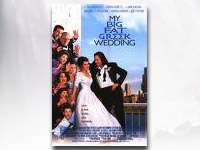My Big Fat Greek Wedding (Nia Vardalos, 2002)

In a year of multiple surprises at the box office, the one that takes the cake (the wedding cake, that is) surely must be My Big Fat Greek Wedding. The simple, clichéd comedy about a plain-Jane, Greek-American woman falling in love and marrying a good looking, Anglo college professor (one reviewer called him “her WASP Fabio”) has almost nothing extraordinary about it. The plot is unoriginal, the performances very good, but not great, the direction pedestrian, the camera work plain, but uninspiring. Critical reaction, while generally positive, was decidedly lukewarm (Gene Seymour of the L. A. Times: “All told, this is going to make passable television. Eventually.”).
Yet in its box office popularity, Wedding has accomplished feats virtually unknown prior to its release. Most successful movies have their largest box office take on opening weekend; sometimes it comes in their second or third week. Many low-budget, less-promoted independent films, like Wedding, open unspectacularly, grow by word-of-mouth for a few weeks, or even a month or two if really successful, then close, declaring success at having made a profit at all. Opening on April 19, Wedding had a moderate take in excess of $500,000, and its owners (including Tom Hanks and his Greek-American wife Rita Wilson) were pleased. But as the spring and summer wore on, the film simply got more popular each week, until the third week of September when it peaked at $14.6M only to lose in the box office race to another ethnic comedy, Barbershop. Still playing, as of this writing, on an incredible 1,977 screens, Wedding earned $5.6M in the first weekend of its seventh month of release. Even Titanic, by comparison, made less than $1M on less than 500 screens at the same point in its tenure in American theatres.
What makes this film so appealing? Some have attributed its success to the humor that is apparent in almost every scene. The father of the bride, Gus Portokalos played by Michael Constantin, regularly causes the biggest belly laughs with his simple solution of Windex for ailments from upset stomachs to pimples, and his fantastic etymologies, relating almost every distinctive word he hears to its “Greek roots” (including “kimono” and “Miller”!). Aunt Voula (Andrea Martin) cops the funniest scene in the movie as she describes the medical history of a suspicious lump in her shoulder to the poor, unsuspecting parents of Ian, the bridegroom played by “Sex in the City’s” John Corbett. At every point in the film, we are never far away from a laugh, and certainly that has much to do with the movie’s success. But lots of movies are knock-down funny without being the success Wedding is, and even Wedding’s gags, as Seymour wrote, are “funnier the first or second time than…the seventh or 12th.”
Other hypotheses for the movie’s popularity involve the plainness of its central characters, the sweetness of the love story, and the interesting nature of the ethnic premise. Only Corbett is really good-looking, and his good looks are deconstructed by his wonderfully goofy performance as the slightly awkward odd-man-out whose love for Toula (the central character played by Nia Vardalos whose project this was and who wrote the screenplay) gradually enables him to become comfortable with his new-found family. This atmosphere creates a sympathy with the audience; this is a family and a story that could happen to any of us. The love story is uncomplicated and unalterably sweet—no arguments or break-ups with these two. And the interest in ethnic custom as it relates to family is a well-established box-office draw (anyone ever heard of The Godfather?). Perhaps all these, done well, combine to create the phenomenal success Wedding has enjoyed.
Let me make another hypothesis, however. This movie succeeds where others have failed because it comes at a time in our nation’s history when we want stories that take us beyond the complexity and, particularly, the harshness of life as we have known it in the last 20 months. After the difficulties of 2001, with its interminable recount of election tallies, gruesome reminder of our vulnerability in the events of 9/11, and long, slow depressing slide in the economy, we needed to laugh—long and hard and with the least convolution possible. This film rarely gets serious. When Toula’s brother, Nicky, tells her: “Toula, you did it. Don’t let your past dictate who you are, but let it be part of who you become” and she begins to tear up, telling him how sweet the thought is, he says, “Yeah, that Dear Abby really knows her stuff.” The standard, “mother-tells-the-overly-concerned-father-that-they-love-each-other-and-he-needs-to-recognize-it-fast-or-lose-his-daughter” scene is punctuated by Constantin’s wise-cracks, refusing to let the scene fall into melodrama. Scene after scene begins to get dramatic, only to dissolve into one hilarious joke after another.
While every movie ought to be discussed and thought about, if we, as Christians, are going to receive the full benefit of it, Wedding resists all but the lightest of analysis. There are important points to talk about to be sure (see the questions attached to this review), but the central themes of love-conquering-all and family being a crucial support to any successful marriage are straightforwardly told in this simple, enjoyable fairy tale, leaving little else to say. Perhaps we should kick back, enjoy My Big Fat Greek Wedding, and let tomorrow take care of itself. But when tomorrow comes, you may want to think a little about what you’ve seen.

